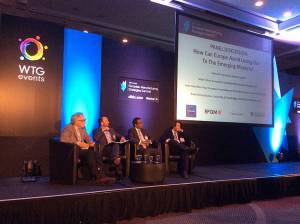 Investment in machinery and equipment remains unresponsive to growing policy in the EU industry, the European Commission’s Report on Member States’ Competitiveness (2014) affirms. Today, the European machine tool consumption remains 30% below the pre-crisis level and shows sluggish recovery. Delayed investments in productive capital assets impede productivity growth and innovation, thus undermining industrial competitiveness in the long term.
Investment in machinery and equipment remains unresponsive to growing policy in the EU industry, the European Commission’s Report on Member States’ Competitiveness (2014) affirms. Today, the European machine tool consumption remains 30% below the pre-crisis level and shows sluggish recovery. Delayed investments in productive capital assets impede productivity growth and innovation, thus undermining industrial competitiveness in the long term.
Investing in new production systems is key to provide European industrial users with significant productivity and efficiency gains as well as cutting edge manufacturing capabilities that make product innovations possible. Mr. Jean Camille Uring, CECIMO President, addressing European industrial leaders at the 10th European Manufacturing Strategies Summit in Düsseldorf, stated: “In the face of growing competitive pressures from international competitors and high average manufacturing costs in Europe, manufacturing companies need to shift to automated and high performance production systems to remain competitive. However, much needed productive capital investments are hindered by economic uncertainty, low business confidence and severe access to finance problems affecting especially SMEs in some parts of Europe.”
Moreover, corporate investments in Europe do not compensate the depreciation rates. An internationally known consultancy firm calculated the gap in investments as high as 30 billion euro in 2014. Europe’s industrial assets are consequently, losing value. For instance, according to available figures, the average age of the installed machine tool base has grown in key manufacturing countries like France and Germany over the past five years. “The obsolescence of the machinery park risks dragging European industry into a downward spiral of ‘low productivity – low value added – low profitability’. And, all this is happening as global competitors continue to upgrade their technological capabilities and boost productivity rates” explains Filip Geerts, CECIMO Director General.
CECIMO recently urged the European Commission to present an action plan to address bottlenecks to investment. In some parts of Europe, macro-economic conditions – which are not linked to companies’ business performance – put to a brake to the adoption of advanced manufacturing technologies. A common European response is needed to restore the level playing field for all companies, to relieve industrial value chains from relocation pressures and to accelerate the shift to intelligent, competitive and sustainable manufacturing.



